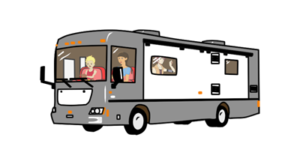RV Insurance
 When researching a RV insurance , you will need to consider what type of vehicle you want to insure. While many auto insurance companies provide RV insurance, you need to be clear on what you are covering: a RV / motor home or travel trailer.
When researching a RV insurance , you will need to consider what type of vehicle you want to insure. While many auto insurance companies provide RV insurance, you need to be clear on what you are covering: a RV / motor home or travel trailer.
RV (Motor-home, Recreational Vehicle)
To qualify for a RV insurance, most providers require that the following be permanently attached:
- Living quarters.
- Cooking appliances.
- Refrigeration.
- Bathroom.
- Heating and/or air conditioning.
- Drinkable water supply system.
- 110 – 125 volt electrical system.
Travel Trailers & Campers
Travel trailers and campers are non-motorized and are typically towed. To qualify for travel trailer insurance, you may be required to have a Cooking facility and sleeping area permanently attached.
Purchasing RV / Motorhome Insurance
Protect your valuable investment. You will lose financially if something happened to your RV and you are not properly protected. With Click & Save, you can buy the best protection you possibly can at the best price you can get. When researching Florida RV Insurance Quotes, don’t assume your auto insurance covers your recreational vehicle.
RV insurance coverage requirements:
Drivers are required to have the following minimum auto insurance coverage and limits:
- $10,000/$20,000 bodily injury liability coverage per person/per incident
- $10,000 property damage liability coverage
- $10,000 personal injury protection (PIP) per person
Key factors in determining your RV Insurance Quotes:
- Insurance history (Driving record and claims history)
- Coverage (Limits and deductibles)
- Year, make, and model of your vehicle
- Age, gender, marital status and years licensed
- Home ZIP code
- RV / Motorhome Value
Need optional coverage?
Optional coverage will give you added financial protection in the event of an accident resulting in a claim.
- Comprehensive
- Collision
- Towing
- Rental Car
- Customized parts and equipment
- Auto loan or lease
- Uninsured/under-insured motorist bodily injury
- Vacation Liability
Facts about driving in Florida:
According to the Insurance Research Council, nearly 24% of Florida drivers are uninsured. That is almost double the national average. Uninsured motorist coverage is optional. However, if you’re in an accident with an uninsured or under-insured motorist, this policy option helps pay injury and property damage costs for you and your passengers.
Florida is a no-fault auto / RV insurance state.
No fault limits your right to sue an at-fault driver after an accident. No-fault coverage (also referred to as personal injury protection or PIP) applies to medical expenses after an accident. PIP does not apply to property damage.
